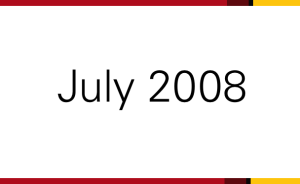Alhurra and the Predicament of U.S. International Broadcasting to the Middle East
Alhurra – “The Free One” – is a U.S. government-funded broadcaster available throughout the Middle East. Established in 2004, Alhurra, along with its FM radio counterpart, Radio Sawa (launched in 2002), represent America’s largest commitment to public diplomacy in the region. Over the last six years, the U.S. government has invested just under $500 million dollars in the two broadcasters.
Overseen by the Broadcasting Board of Governors, an independent agency reporting directly to Congress, Alhurra’s mission is to promote freedom and democracy in the region through the accurate and objective representation of U.S. policies. Broadcasting from Springfield, Virginia, the station’s programming includes a mix of traditional newscasting, cultural programming, political talk shows, documentaries, as well as some American entertainment programming dubbed into Arabic.
Since its inception, Alhurra has attracted controversy. In 2006, the United States General Accountability Office issued a report documenting the many challenges facing Alhurra and Radio Sawa, notably poor management and weak performance. In March 2007, Alhurra gained significant media and public attention when Joel Mowbray, a conservative syndicated columnist for Knight-Ridder and a frequent contributor to the National Review, published a series of articles in the Wall Street Journal accusing the channel of providing “platforms to Holocaust deniers and Islamic terrorists.” In these articles, Mowbray revealed that Alhurra had aired the entirety of Hezbollah leader Hassan Nasrallah’s December 7, 2006 speech, an explicit violation of Alhurra’s Journalistic Code of Ethics and its Congressional mandate, and that they provided extensive and deferential coverage of a Holocaust denial conference held in Tehran in December 2006. In May 2007, Congress held hearings to further examine the accusations. In a statement before Congress, Alhurra executive, Joaquin F. Blaya, acknowledged the channel’s mistakes and assured his audience that corrective measures had been taken and that terrorists and Holocaust deniers would never again use the channel as a platform.
In addition to this political scrutiny, Alhurra has also faced criticism from media scholars and practitioners. Professor Shibley Telhami argues that Alhurra’s actual influence on public opinion in the region is minute given its relatively small audience share. Moreover, in the face of a growing number of Middle Eastern satellite news channels (e.g., Al Jazeera, Al Arabiya and Al Manar, as well as other broadcasters funded by Western governments such as the UK’s BBC Arabic TV), former deputy director of the Voice of America Alan L. Heil argues that the likelihood of Alhurra gaining any ground against its more respected competitors is highly improbable. Arab media expert, Marc Lynch, suggests that Alhurra’s problems boil down to the impossible balance required to appease its Congressional critics while also providing coverage that resonates with an opinionated Arab audience. Lynch argues that by acquiescing to Congressional pressure and ensuring that its content best represents and promotes the U.S. agenda in the region, Alhurra quickly lost credibility among an Arab audience already critical towards much of America’s current foreign policies.
In June of this year, Alhurra was once again embroiled in controversy after two scathing media reports—one produced by the media watchdog ProPublica that was aired on CBS’s 60 Minutes, the other by the Washington Post’s Craig Whitlock—echoed many of the previous criticisms and added evidence to several new ones. ProPublica’s critique was that Alhurra was far from pro-U.S. in its broadcasts which, along with key interviews with senior U.S. officials, habitually aired adversarial views from all other sides – ranging from the Sunni Iraqi insurgency, through the Popular Front for the Liberation of Palestine, Hamas, and Islamic Jihad, to pro-Hezbollah and pro-Iranian leaders and radical Shiite Islamists. In addition to the anti-American inflammatory rhetoric, ProPublica decried Alhurra’s managerial inefficiency, favoritism in hiring, and lack of proper editorial and financial oversight as misuse of taxpayers’ money. It further drew attention to a gaping linguistic and cultural disconnect between the network’s senior management on one hand, and its executive producers, reporters and news casts on the other.
The criticisms leveled generated a wave of media coverage and an intense exchange between the channel’s critics at ProPublica and its supporters at the BBG. While important points were raised on both fronts—addressing the station’s failures to project a fair image of the U.S. on the one side, and defending its mission of providing credible programming of high journalistic standards on the other—little agreement emerged in the way of envisioning what would constitute a truly effective U.S. public diplomacy strategy for engaging the Arab world.
More constructive opinions were offered by other sources and writers in the blogosphere. Analysts seemed to converge on the view that the responsibilities of state-sponsored international broadcasting to serve the national interest while providing balanced news and catering to well-informed, skeptical audiences, are by definition mutually exclusive. In a PBS interview, Shibley Telhami further elaborated on the limits of influencing publics through broadcast media by rejecting the notion that there is a relationship between what people watch and the political opinions they form. Communications scholar Craig Hayden similarly argued for a re-conceptualization of the approach to international broadcasting by revamping it as a more interactive, participatory medium that would not only fit better in the current Arab media landscape, but would also help create a more democratic media culture in the Middle East.
The unfolding controversy surrounding Alhurra clearly indicates the dilemma faced by the U.S.’s Middle East information effort.
This report is an aggregation of recent press – both in the mainstream media, as well as in the blogosphere – of Alhurra’s critics and defenders with the intention of providing a balanced perspective on the issue and stimulating reflection on the broader challenge of U.S. public diplomacy through international broadcasting.
Most Read CPD Blogs
-
January 29
-
January 20
-
December 17
-
January 28
-
January 2
Visit CPD's Online Library
Explore CPD's vast online database featuring the latest books, articles, speeches and information on international organizations dedicated to public diplomacy.









Add comment